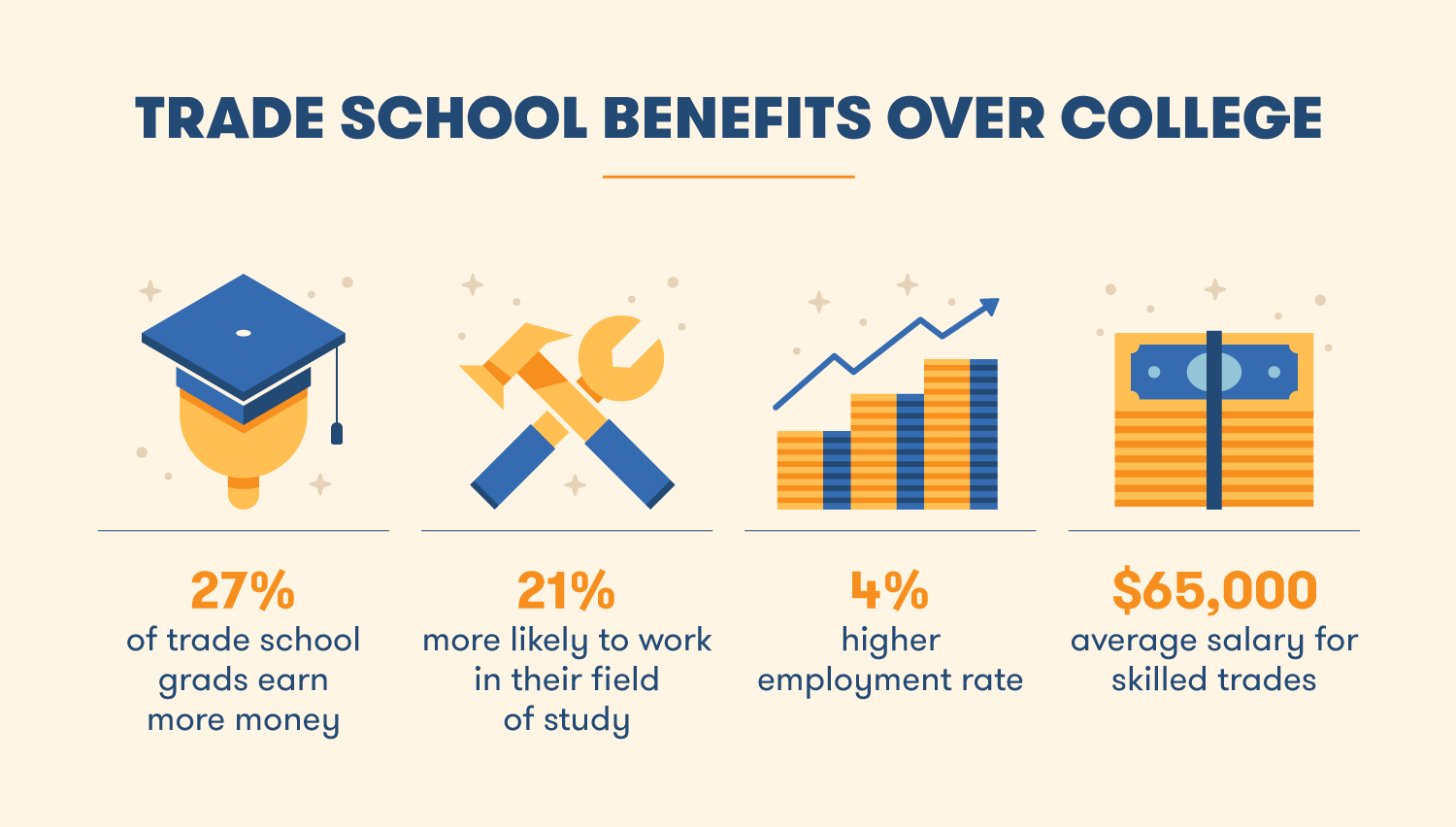Education plays a crucial role in shaping our future, and deciding between trade school and college is a pivotal choice that can significantly impact our career prospects. While both options offer unique benefits and opportunities, it’s essential to understand the differences and make an informed decision based on your goals, interests, and individual circumstances.
In this comprehensive guide, we will explore the pros and cons of trade school and college, examine the job opportunities available in each field, and provide valuable insights to help you navigate this critical decision. Whether you’re a high school student contemplating your post-secondary education or an adult seeking a career change, this article aims to equip you with the knowledge and insights necessary to make the right choice for your future.
Trade School: A Pathway to Specialized Skills and Quick Entry Into the Workforce
Trade schools, also known as vocational or technical schools, offer specialized training programs that focus on practical skills required for specific trades and industries. These programs are designed to provide hands-on experience and prepare students for immediate entry into the workforce. Here are some key advantages of trade school education:
1. Cost-Effective Education

One of the primary advantages of trade schools is their affordability compared to traditional four-year colleges and universities. The average cost of trade school programs is significantly lower than the tuition fees of a bachelor’s degree. This cost-effectiveness makes trade schools an attractive option for individuals looking to acquire valuable skills without accumulating a substantial amount of student loan debt.
2. Shorter Duration of Programs
Trade school programs typically have a shorter duration compared to traditional college degrees. While a bachelor’s degree may take four years or more to complete, trade school programs can be completed in a matter of months or a few years, depending on the field of study. This shorter time frame allows students to enter the workforce quickly and start earning a living sooner.
3. Practical, Hands-On Training
Trade schools focus on providing practical, hands-on training that directly relates to the skills required in specific trades and industries. Students have the opportunity to gain experience through internships, apprenticeships, and on-the-job training, which enhances their employability and prepares them for the demands of the job market.
4. In-Demand Job Opportunities
Trade school graduates often find themselves in high demand in the job market. Many trade industries, such as healthcare, construction, automotive, and skilled trades, have a shortage of qualified professionals. This demand for skilled workers can lead to excellent job prospects and career stability for trade school graduates.
5. Career Advancement Opportunities
Contrary to popular belief, trade school education does not limit career advancement. Many trade professions offer opportunities for growth, specialization, and entrepreneurship. With experience and additional certifications, trade school graduates can move up the career ladder and even start their own businesses.
While trade schools offer numerous benefits, it’s important to consider the potential drawbacks before making a decision. Here are some factors to consider:
1. Limited Academic Exposure
Trade school programs are highly focused on specific skills and trades, which means students may have limited exposure to general education courses. While this can be advantageous for those who want to enter the workforce quickly, it may limit future educational opportunities or career paths that require a broader knowledge base.
2. Lower Earning Potential
In some cases, trade school graduates may earn less initially compared to individuals with a bachelor’s degree. However, it’s important to note that over time, with experience and specialization, trade professionals can achieve competitive salaries and even surpass the earnings of some college graduates.
3. Limited Transferable Skills
Trade school programs are tailored to specific industries, which means the skills acquired may not be easily transferable to other fields. This can limit career flexibility and may require additional training or education if a student decides to switch industries in the future.
College: A Pathway to a Broad Education and Diverse Career Opportunities
College education offers a comprehensive academic experience that goes beyond specialized skills. It provides students with a broad knowledge base, critical thinking abilities, and exposure to various disciplines. Here are some advantages of pursuing a college degree:
1. Broad Range of Academic Opportunities
College education offers a wide range of academic opportunities, allowing students to explore various disciplines and gain a well-rounded education. Students have the freedom to pursue majors in arts, sciences, humanities, business, technology, and many other fields, providing a diverse range of career options.
2. Intellectual Development and Critical Thinking Skills
College education emphasizes critical thinking, analytical skills, and the ability to engage in intellectual debates. Through coursework, research projects, and discussions, students develop strong problem-solving abilities and learn to think critically, which is valuable in any career field.
3. Networking and Connections
College campuses provide opportunities for networking and building connections with peers, professors, and industry professionals. These connections can be valuable for future career prospects, internships, and job opportunities.
4. Higher Earning Potential
On average, individuals with a bachelor’s degree tend to earn higher salaries compared to those without a degree. College graduates often have access to a broader range of job opportunities and are more likely to secure higher-paying positions.
5. Pathway to Advanced Degrees
A college degree is often a prerequisite for pursuing advanced degrees, such as master’s or doctoral programs. If you have aspirations of pursuing a career that requires advanced education, a college degree is a necessary stepping stone.
While college education offers numerous advantages, it’s important to consider the potential drawbacks as well. Here are some factors to keep in mind:
1. Higher Tuition Costs
College education is generally more expensive than trade school education. Tuition fees, along with additional expenses such as textbooks, housing, and living costs, can accumulate and result in significant student loan debt.
2. Lengthy Time Commitment
Obtaining a bachelor’s degree typically requires four years of full-time study. For individuals who are eager to enter the workforce quickly, this longer time commitment may be a deterrent.
3. Limited Hands-On Experience
While some college programs incorporate internships and practical experiences, the focus is primarily on academic coursework. This means that students may have limited hands-on experience in their chosen field, which can pose challenges when transitioning to the job market.
4. Highly Competitive Job Market
As more individuals pursue college degrees, the job market has become increasingly competitive. A bachelor’s degree may no longer guarantee immediate job placement, and graduates may face challenges in finding employment in their desired field.
Job Opportunities: Trade School vs College

When considering trade school or college, it’s crucial to assess the job opportunities available in each field. Both trade professions and careers requiring a college degree offer unique employment prospects. Let’s explore the job opportunities associated with each path:
Trade School Job Opportunities
Trade school graduates can find job opportunities in a variety of industries. Here are some examples:
1. Skilled Trades
Trade schools offer programs in skilled trades such as plumbing, electrical work, HVAC (heating, ventilation, and air conditioning), welding, and carpentry. These trades are in high demand, and skilled workers are needed to address infrastructure needs and perform essential services.
2. Automotive Technology
Trade schools provide automotive technology programs that train students to become automotive technicians. Graduates can work in dealerships, repair shops, or even start their own businesses.
3. Healthcare Support
Trade schools offer programs in healthcare support roles such as medical assisting, dental assisting, pharmacy technician, and medical coding. These professions play a critical role in the healthcare industry and are in high demand.
4. Culinary Arts
Trade schools provide culinary arts programs for individuals interested in pursuing careers as chefs, bakers, or restaurant managers. The food service industry offers a wide range of job opportunities, from fine dining establishments to catering businesses.
College Job Opportunities
A college degree opens doors to diverse career paths across various industries. Here are some examples:
1. Business and Management
College graduates with degrees in business administration, finance, marketing, or management have opportunities in corporate settings, entrepreneurship, consulting, and finance.
2. Technology and Engineering
Degrees in computer science, information technology, engineering, or software development can lead to careers in technology companies, software development firms, or engineering firms.
3. Healthcare and Nursing

College degrees in nursing, healthcare administration, or public health can lead to careers in hospitals, clinics, research institutions, or healthcare administration.
4. Education
College graduates with degrees in education can pursue careers as teachers, administrators, or educational consultants in public or private schools, colleges, or educational organizations.
5. Humanities and Social Sciences
Degrees in fields such as psychology, sociology, political science, or communications can lead to careers in counseling, social work, public relations, journalism, or government agencies.
Additional Information:
It’s important to note that some professions may require a combination of trade school education and college degrees. For example, individuals interested in becoming architects may pursue a trade school program in architectural drafting and then continue their education at a college or university to obtain a bachelor’s degree in architecture.
Making the Right Choice for You
Choosing between trade school and college is a personal decision that depends on your goals, interests, and individual circumstances. Here are some key factors to consider when making your choice:
1. Personal Interests and Skills
Assess your interests, strengths, and skills. Consider which path aligns better with your passions and aptitudes. If you enjoy working with your hands, solving practical problems, or have a specific trade in mind, trade school may be a suitable option. If you have a passion for academic learning, research, or desire a broader education, college may be the right choice.
2. Career Goals
Think about your long-term career goals and the professions you aspire to pursue. Research the educational requirements and job prospects in your desired field. Some careers may require a college degree, while others may value specialized trade skills. Understanding the job market and industry trends can help you make an informed decision.
3. Financial Considerations
Consider your financial situation and the costs associated with each educational path. Evaluate the tuition fees, potential student loan debt, and the earning potential in your chosen field. If cost-effectiveness and quick entry into the workforce are important factors for you, trade school may be a more viable option.
4. Future Educational Aspirations
Think about your future educational aspirations. If you envision pursuing advanced degrees or a career that requires a higher level of education, a college degree may be necessary. However, if you prefer to gain practical skills and enter the workforce sooner, trade school can provide a solid foundation for immediate employment.
5. Personal Circumstances
Consider your personal circumstances, such as family responsibilities, geographic location, and available resources. Some individuals may prefer trade school due to its shorter duration and immediate employment prospects, while others may have the flexibility and support to pursue a college degree.
Remember, there is no one-size-fits-all answer to the trade school vs college debate. It’s essential to weigh your options, conduct thorough research, and seek guidance from career counselors, professionals in your desired field, and trusted mentors. Ultimately, the right choice is the one that aligns with your goals, aspirations, and individual circumstances.

